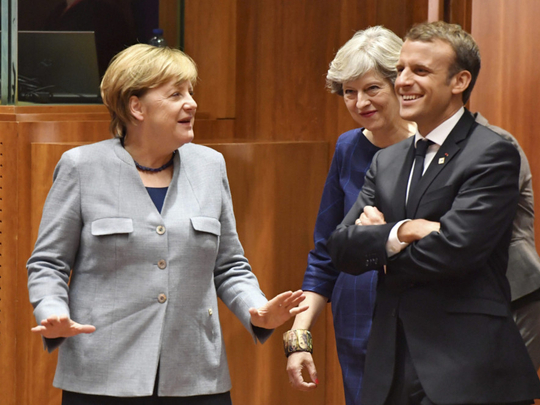
Brussels: German Chancellor Angela Merkel offered Theresa May the political cover she’s been asking for to take further steps in Brexit talks, calling on both sides to move so that a deal can be reached by year-end.
The UK prime minister, who was upbeat about the prospect of reaching a good deal, offered a shade more clarity on the divorce bill, and said negotiating teams would continue to hash out the details.
“We’re going through them line-by-line and we will continue to go through them line-by-line, and the British taxpayer wouldn’t expect its government to do anything else,” she told reporters at the European summit in Brussels.
Late on Thursday May urged leaders to help her find a deal she could sell to sceptics at home. Her counterparts responded with words of encouragement — though no concrete concessions.
Merkel said there’s “zero indication” that Brexit talks won’t succeed and she “truly” wants an agreement rather than an “unpredictable resolution.” She welcomed the concessions May made in a landmark speech in Florence last month and said she’s “very motivated” to get talks moved on from the divorce settlement to trade by December.
“Now both sides need to move,” she told reporters after hearing May speak at dinner, in a shift of rhetoric for the EU side, which has previously insisted that it’s up to the UK alone to make the next move.
Talks are deadlocked over the issue of the financial obligations, eating into the limited time available to forge a trade deal before Britain leaves the bloc. The initial offer on money that May made in Florence — about €20 billion (Dh86.5 billion, $24 billion) and some unspecified additional commitments — hasn’t been converted into detailed negotiating positions.
Helping hand
EU leaders are aware of the fragility of May’s position — she’s trying to hold onto her job after a failed election and keep a squabbling Cabinet together. That’s why they offered her words of encouragement on Thursday, according to an EU official speaking on condition of anonymity.
May delivered her “best performance yet,” Maltese Prime Minister Joseph Muscat told reporters Friday morning. “It conveyed a warm, candid and sincere appeal that she wants progress to be made, that she has moved in her position so I think that was appreciated.”
The conclusions of the summit also point to possible progress before year-end: the EU side will make preparations so that they are ready to start trade talks in December if leaders approve the start of talks. It was less than the UK was hoping for — it wanted talks to be expanded now to include the transitional arrangement that May wants to put in place after Brexit to smooth the process for businesses.
Even as the EU continues to demand more from May, the tone of the summit was friendlier than earlier encounters. Footage showed May chatting to Merkel and French President Emmanuel Macron with an ease that contrasted with previous moments of awkward solitude. May also reiterated her friendliest lines: the UK is “unconditionally committed” to the EU’s defence and she wants to continue a “deep” partnership after the split.
The chancellor’s positive tone on Brexit was in marked contrast to Germany’s portrayal in the UK media as the principle obstacle to Britain’s attempts to shift negotiations onto trade and a transition period.
May’s message to leaders was clear: she cannot afford to take home a bad deal, or to wait much longer for a meaningful offer, because she needs to convince a sceptical public at home.
“There is increasingly a sense that we must work together to get to an outcome we can stand behind and defend to our people,” May told the 27 other EU leaders, her officials said. “The clear and urgent imperative must be that the dynamic you create enables us to move forward together.”
Citizens’ rights
She also pointed out that EU leaders will need to be able sell the results of talks to their own people. Each country has its own sensitivities on Brexit: those with large migrant populations in the UK want a good deal on citizens’ rights, others are keener to strike a good trade deal.
The leaders are acutely aware that they wouldn’t be able to explain to their voters if they let Britain off too lightly on the bill. May has agreed to pay into the budget for two years after Brexit, which amounts to about €20 billion, and also meet the UK’s financial obligations more broadly.
Those additional commitments would add up to another €20 billion, people familiar with the discussions said last month. The EU side has floated numbers closer to €60 billion. That number was put to May by reporters on Friday and she didn’t knock it down.
She made clear that the bill will only be settled in the context of the final overall deal. Some people familiar with the situation reckon the final number may never be published as it’s sliced and diced to be more politically acceptable.












